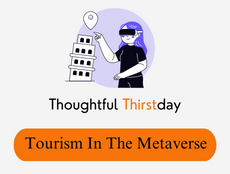With the emergence of the Internet of People in the 2000s and the Internet of Things in the 2010s, the metaverse represents the upcoming phase of digital revolution as an Internet of Place, which enables shared virtual experiences. It is imperative for leaders to proactively strategize on how to leverage the metaverse for creating new avenues of growth and development.
More and more industries see its game-changing potential, attesting to its rising popularity and significance. And one such sector is tourism. The metaverse has the potential to revolutionize the tourism industry, offering unprecedented opportunities for growth and innovation.

According to McKinsey’s research report, a significant 62% of respondents expressed great enthusiasm for the idea of travel in the metaverse, particularly the opportunity to explore locations that are beyond their physical reach, such as outer space.
Before shining a spotlight on the tourism in the metaverse, potential impact of metaverse on the tourism, the benefits and future of metaverse in the travel industry, let us take you on the virtual tour in metaverse.
Put on your seat belt..!!
Let’s Experience A Short Journey In The Metaverse (Might Be The Future Of Tourism)
To understand this tour deeply, we will use a fictional character named “Sam”. And in this journey we will have a look at both digital and physical tour, especially how metaverse’ digital tour can help the person in planning his physical tour. Even if one is limited on time or resources, he can still fulfill his wanderlust by using Metverse to take a virtual trip.
“I wish you could also be there along with Sam”.
Sam, a young Millennial, is really enthusiastic about traveling and seeing the world. The yearly tradition of taking a vacation is continuing this year. His ideal vacation this year involves exciting water sports and activities, therefore he’s hoping to visit an island. He has begun his investigation into the options in order to select the best one.
He also asks around for advice from friends before making up his mind, but nobody he knows has ever been to an island like that. However, his departure dates are rapidly approaching, and he is concerned that he would have to pay extra for the flight fee if he is late. He thus instantly visits the airline’s website to purchase his tickets.
During the booking process on the airlines website he caught up with the option “try and buy destination experience”
Try And Buy Experience
After clicking on the link, he enters a virtual world where he may visit the islands and observe the activities he can perform, such as scuba diving, swimming with dolphins, and many other water sports! It captivates him. He can even tour the accommodations. He then discovers a beachfront property overlooking the sunset! In this new virtual environment, he meets individuals who share the same experience and are happy to talk about that property.
He gets new friends there and of course finalizes the place to stay.
Finalize The Airlines
Just two clicks and reservation done..!! That too in exchange of cryptocurrency.
Sam takes a virtual aircraft tour, the travel class he is going to choose, the services available there, the view from his seat, and feels like he is really traveling. And finalizes his cabin class after comparing options.
“Sam Bot”, The Personal Guide
Once Sam’s flight has been booked, the airline will assign him an AI bot, appropriately named “Sam Bot”, to assist him throughout the flight.
As the traveling dates approach, Sam Bot gets actively involved in his work. From packing to the essential items to be taken on the trip, Sam Bot provides every minute information. Not only this, this AI bot automatically manages the boarding pass and baggage as well.
What about meals on the flight? Don’t worry, AI bot will manage.
The Destination
When Sam finally gets to his location at the end of this trip, he will discover that an AI bot has already reserved a taxi for him there, and it will be ready and waiting for him when he arrives. As soon as Sam starts leaving for the destination, a message will appear on his smartphone asking how was your Metaverse experience?
And when Sam is enjoying the scenic views from the window on his way to the destination, then another notification will be received and this message will be from the other metaverse friend who is staying in the same property as Sam’s destination, and reached there with the same process.
Did you see how one click made Sam’s journey easier?
At one point he was unable to finalize the destination, on the other his entire trip was organized with a single click, ensuring that he not only reached his destination but also made some new friends along the way.
This is the power of Metaverse in Tourism.
Travelers may now get a taste of a location before ever setting foot there, thanks to the incorporation of metaverse technology into the travel industry. One of the main factors contributing to the expansion of the metaverse as a tourist destination is the development of virtual attractions including museums, theme parks, zoos, and other tourist hotspots.
How Metaverse Is Transforming The Tourism Sector?
Advertising in the digital space opens up a $13 billion market for the travel industry in the metaverse. By the year 2030, it is expected that virtual events would generate 20% of total income.
The tourism business might be profoundly affected by the advent of the metaverse, a virtual reality world in which users can interact with a computer-generated environment and other users. Here are a few examples of how progress in the metaverse might affect the tourism sector:
1. Virtual Vacations Experience
The metaverse has the potential to provide users with lifelike simulations of travel that mimic the feel of actually visiting a place. Users of today’s cutting-edge VR equipment may virtually go anywhere, whether it to a famous monument, a historic city, or even a beach. Individuals who are unable to travel owing to financial, physical, or time restrictions may find this to be a practical and cost-effective option.
2. Communication between cultures
The ability to communicate with individuals from all over the world is one of the many benefits of the metaverse. To better understand and appreciate the world’s many cultures, users can participate in virtual events, cultural exchanges, and language exchanges. This can motivate people to really go abroad and learn about these cultures for themselves.
3. Possibilities in advertising and marketing
The expansion of the metaverse may open up fresh channels via which the tourism sector might promote its attractions, hotels, and other offerings to potential customers. Businesses may attract tourists and pique their interest in certain regions by launching advertising campaigns and creating immersive virtual experiences in the metaverse. This can spread the word about popular tourist spots and bring in more visitors.
4. Skill development and training
The metaverse provides a useful venue for those working in the tourism sector to get online instruction. Virtual simulations are a useful tool for enhancing travel agents’ destination expertise, customer service prowess, and crisis management preparedness. Better service delivery and happier customers are possible outcomes.
5. Improved preparation before to departure
Travelers can save time and effort with the help of metaverse portals that facilitate research and trip preparation. Users have the option of digitally checking out lodgings, seeing 360-degree footage of popular tourist spots, and reading up on the opinions and suggestions of fellow travelers in real time. Individuals can benefit from improved travel experiences thanks to their ability to make more well-informed decisions.
6. Initiatives for eco-friendly tourism
By promoting online vacations as an alternative to traditional trips, the metaverse may help the sustainable tourism movement. The metaverse can help reduce tourism’s negative impact on the environment by cutting down on the amount of energy used for travel and lodging. This fits well with the sector’s rising interest in environmentally friendly methods of operation.
Organizations Shaping The Travel Sector Using Metaverse
1. Millennium Hotels and Resorts
Well, this is quite fascinating! Millennium Hotels and Resorts has made history by opening the first-ever hotel in the metaverse with the launch of M Social Decentraland.
The concept of the virtual hotel is a fascinating blend of both real and virtual experiences, carefully crafted to captivate and immerse guests. The hotel offers a virtual tour experience where guests can explore the property with the help of an avatar. It’s designed to mimic the real-world Millennium properties. Anyone who takes the trip has a chance to win real-world prizes.
2. KLM
KLM has implemented a cutting-edge solution to enhance its aircraft turnaround time. The airline is now providing its cleaning crew with virtual fleet tours on an iPad, complete with a VR headset.
This innovative approach enables the crew to become more familiar with each cabin, ultimately leading to a more efficient cleaning process. Choosing immersive 360° images over traditional 2D renderings on paper led to improved efficiency, enabling the staff to complete the cleaning task 15 minutes earlier than expected and with zero errors.
Well, it’s fascinating to see how this airline has implemented technology to enhance their operations. Following a successful test run, they have now integrated this technology for all their cabin crew and caterers.
3. Emirates
Emirates, an early adopter of virtual reality technology, is all set to offer what it calls “signature metaverse experiences” to passengers. It is also working on NFTs, or non-fungible tokens, which may be used for either transactions or as a kind of investment. The airline has transformed its Expo 2020 pavilion into an innovation hub for non-fungible tokens(NFT), the metaverse, and Web3 projects as part of its dedication to innovation.
Thoughts
The metaverse will undoubtedly alter the way people travel. It provides a virtual alternative to physical travel by providing immersive experiences that are both affordable and convenient.
It promotes intercultural dialogue, facilitates individual inquiry, and backs up environmentally friendly efforts. It is true that there is no substitute for physical travel but the metaverse opens up whole new avenues for exploration.
Still there is a need for more investigation into facilitating and enabling blended tourist experiences in preparation for the future Metaverse age.
Till then enjoy Sam’s Metaverse travel..!!

